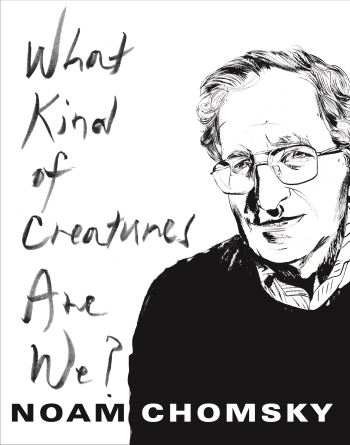What Is the Common Good?
“[H]umans are social beings, and the kind of creatures we become depends crucially on the social, cultural, and institutional circumstances of our lives. We are therefore led to inquire into the social arrangements that are conducive to the rights and welfare of people, to fulfilling their just aspirations—in brief, the common good.”
— Noam Chomsky
This week, our featured book is What Kind of Creatures Are We?, by Noam Chomsky. For the final post of the week, we have an excerpt from the third chapter of the book: “What Is the Common Good?”:
2 Responses
Leave a Reply
You must be logged in to post a comment.



The majority works on conditioned behavior patterns, which are characterized by focusing on external dependencies, discharge of responsibility and agreed and rewarded unreason. Thus, the supervisor and caregivers come onto the pitch. All this is called the hierarchy or the old world order.
In this case, you can forget all currently existing ideologies, habits and conventions because they all are superimposed by the hierarchy.
Its origin is found in an unwritten agreement between a mother and her child: “You’re fine as long as long as I like it.” This is what we call a condition – the system main condition.
With this agreement, people also exchange their self reflection to a projection, blaming is born and also reward and punishment. All this can be found in the kindergarten, the school and later on at work.
The legal and the monetary system are working on the same principle, but the legal system is only an artificial tool to handle system symptoms. In addition, it is only based on a rewarded principle of faith, to obtain the hierarchical structures to overlay the natural structures and its principles.
What we called “the system” is a projection of the behavior patterns of the people.
aso.
Similar “institutional circumstance” work upon, impact and influence a large multitude yoked to such circumstance to give rise to individuals of very widely diverging attainments. Identical “social arrangenments” make out of the subject fraternity knowledge barrons to black-marketeers. Why is it so? Some left-over strength of thought needs to be expended on the receipient after an aerobical critique of the apparatus.
“Libertarian socialiam” is to a mind shakled to conventional categories a hybrid new species more like a mutant of an idea created by very unseemly genetic modification. It’s like splicing and fusing the DNA of the evil with that of angel’s whichever side to rate it from, evil’s or angel’s given that each side sees the other as evil. Not clear if professor Chomsky is the progenitor of the idea or it has some ancestry. Generally understood libertarianism connots one thing, socialism another. The set of principles one abides by, institutions one swears by and seeks to erect and policy course one advocates to bring about frution of one’s world-view is as distantly apart from the principles, institutioins, policy prescription and world-view of another as, say, and this’d make clear, Reagon-Thatcher economics from Castro-Che Guevara economics (Che G. had held ministerial position for a while and presumably made clear what his politics and economics were about.)
Though professor Chomsky spares his reader technical points and terminology his style and presentation of argument, and this only on the basis of the excerpt of the third chapter of the book, comes on the reader as turgid. In part this may be because he has chosen not to cite ‘case-in-points’ from the world around which’d help reader better apprecialte his argument. To say this by way of a case in point one may refer to one of the most well knownn politicl writings, though as much economic and social, since it appeared, Das Capital. It is a book anyone with a good school education can mostly read and understand though for its subject it may apppear to be dreary.